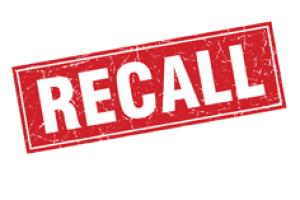Is your manufacturing business recall-ready?

No manufacturer, large or small, can be completely immune from a product recall and the business disruption that may result. While some of the most publicized product recall cases are from well-known brands, one-third of product recalls are from companies with five or fewer employees. Just one recall could mean financial ruin for a small manufacturer that may not have a well-rounded insurance policy in place.
Recall basics
The right insurance protection can offer peace of mind and help protect a business for years to come from a wide range of risks, including product recalls. The following is a sample of additional coverages recommended for manufacturers that may be at risk of a product recall:
- Repair, replacement or repurchasing costs. This covers costs incurred to repair a defective product, replace a product with a similar one and repurchase a product or reimburse customers for payments. It can also cover costs to redistribute and install replacement products or parts sold to customers.
- Customer's lost profit. This coverage protects manufacturers when a product recall affects customers' abilities to deliver their goods. For example, a customer may lose profits from the sale of a manufacturer's products when they are returned or incur additional costs from processing the recall.
- Good faith advertising. After a product recall, there may be costs incurred to help repair the manufacturer's damaged reputation in the marketplace. Often, paid advertising, social media and public relations services are covered for a period of time after a recall.
- Product recall liability coverage. Different from general liability insurance, product recall liability coverage addresses lawsuits brought by a customer over costs associated with a recall.
Beyond financial implications
A product recall can cause serious damage to a company's reputation. However, when a detailed plan is promptly put into action, a product recall can demonstrate a commitment to customer safety, and may ultimately enhance reputation and customer loyalty.
A business' product recall plan can help ensure there is an action plan ready to go in the event of a recall. There are three keys to an effective product recall plan:
- Have a written plan in place. Operating under the stress and time constraints of product recall is not the time to ask, "How are we going to handle this?"
- Designate a team of employees who will be charged with coordinating all aspects of the product recall team. Think of them as a rapid response team, who will help the company get out in front of a potentially very disruptive situation.
- Have a strategy in place for dealing with media; both outgoing news releases and incoming media inquiries.
The best way to protect against the costs and broad impact of a product recall is to avoid it in the first place. For this reason, it's wise to work with an insurance carrier that provides robust risk solutions services, works closely with businesses to identify potential risks and helps implement focused solutions and best practices to reduce the likelihood of a product recall. These value-add services can make a major difference in the success of a manufacturer.
LC OCT 2018-456
Related resources
Is your manufacturing business recall-ready?
No manufacturer, large or small, can be completely immune from a product recall and the business disruption that may result. While some of the most publicized product recall cases are from well-known brands, one-third of product recalls are from companies with five or fewer employees. Just one recall could mean financial ruin for a small manufacturer that may not have a well-rounded insurance policy in place.
Recall basics
The right insurance protection can offer peace of mind and help protect a business for years to come from a wide range of risks, including product recalls. The following is a sample of additional coverages recommended for manufacturers that may be at risk of a product recall:
- Repair, replacement or repurchasing costs. This covers costs incurred to repair a defective product, replace a product with a similar one and repurchase a product or reimburse customers for payments. It can also cover costs to redistribute and install replacement products or parts sold to customers.
- Customer's lost profit. This coverage protects manufacturers when a product recall affects customers' abilities to deliver their goods. For example, a customer may lose profits from the sale of a manufacturer's products when they are returned or incur additional costs from processing the recall.
- Good faith advertising. After a product recall, there may be costs incurred to help repair the manufacturer's damaged reputation in the marketplace. Often, paid advertising, social media and public relations services are covered for a period of time after a recall.
- Product recall liability coverage. Different from general liability insurance, product recall liability coverage addresses lawsuits brought by a customer over costs associated with a recall.
Beyond financial implications
A product recall can cause serious damage to a company's reputation. However, when a detailed plan is promptly put into action, a product recall can demonstrate a commitment to customer safety, and may ultimately enhance reputation and customer loyalty.
A business' product recall plan can help ensure there is an action plan ready to go in the event of a recall. There are three keys to an effective product recall plan:
- Have a written plan in place. Operating under the stress and time constraints of product recall is not the time to ask, "How are we going to handle this?"
- Designate a team of employees who will be charged with coordinating all aspects of the product recall team. Think of them as a rapid response team, who will help the company get out in front of a potentially very disruptive situation.
- Have a strategy in place for dealing with media; both outgoing news releases and incoming media inquiries.
The best way to protect against the costs and broad impact of a product recall is to avoid it in the first place. For this reason, it's wise to work with an insurance carrier that provides robust risk solutions services, works closely with businesses to identify potential risks and helps implement focused solutions and best practices to reduce the likelihood of a product recall. These value-add services can make a major difference in the success of a manufacturer.
LC OCT 2018-456
Related resources
Is your manufacturing business recall-ready?
No manufacturer, large or small, can be completely immune from a product recall and the business disruption that may result. While some of the most publicized product recall cases are from well-known brands, one-third of product recalls are from companies with five or fewer employees. Just one recall could mean financial ruin for a small manufacturer that may not have a well-rounded insurance policy in place.
Recall basics
The right insurance protection can offer peace of mind and help protect a business for years to come from a wide range of risks, including product recalls. The following is a sample of additional coverages recommended for manufacturers that may be at risk of a product recall:
- Repair, replacement or repurchasing costs. This covers costs incurred to repair a defective product, replace a product with a similar one and repurchase a product or reimburse customers for payments. It can also cover costs to redistribute and install replacement products or parts sold to customers.
- Customer's lost profit. This coverage protects manufacturers when a product recall affects customers' abilities to deliver their goods. For example, a customer may lose profits from the sale of a manufacturer's products when they are returned or incur additional costs from processing the recall.
- Good faith advertising. After a product recall, there may be costs incurred to help repair the manufacturer's damaged reputation in the marketplace. Often, paid advertising, social media and public relations services are covered for a period of time after a recall.
- Product recall liability coverage. Different from general liability insurance, product recall liability coverage addresses lawsuits brought by a customer over costs associated with a recall.
Beyond financial implications
A product recall can cause serious damage to a company's reputation. However, when a detailed plan is promptly put into action, a product recall can demonstrate a commitment to customer safety, and may ultimately enhance reputation and customer loyalty.
A business' product recall plan can help ensure there is an action plan ready to go in the event of a recall. There are three keys to an effective product recall plan:
- Have a written plan in place. Operating under the stress and time constraints of product recall is not the time to ask, "How are we going to handle this?"
- Designate a team of employees who will be charged with coordinating all aspects of the product recall team. Think of them as a rapid response team, who will help the company get out in front of a potentially very disruptive situation.
- Have a strategy in place for dealing with media; both outgoing news releases and incoming media inquiries.
The best way to protect against the costs and broad impact of a product recall is to avoid it in the first place. For this reason, it's wise to work with an insurance carrier that provides robust risk solutions services, works closely with businesses to identify potential risks and helps implement focused solutions and best practices to reduce the likelihood of a product recall. These value-add services can make a major difference in the success of a manufacturer.
LC OCT 2018-456
Related resources
Is your manufacturing business recall-ready?
No manufacturer, large or small, can be completely immune from a product recall and the business disruption that may result. While some of the most publicized product recall cases are from well-known brands, one-third of product recalls are from companies with five or fewer employees. Just one recall could mean financial ruin for a small manufacturer that may not have a well-rounded insurance policy in place.
Recall basics
The right insurance protection can offer peace of mind and help protect a business for years to come from a wide range of risks, including product recalls. The following is a sample of additional coverages recommended for manufacturers that may be at risk of a product recall:
- Repair, replacement or repurchasing costs. This covers costs incurred to repair a defective product, replace a product with a similar one and repurchase a product or reimburse customers for payments. It can also cover costs to redistribute and install replacement products or parts sold to customers.
- Customer's lost profit. This coverage protects manufacturers when a product recall affects customers' abilities to deliver their goods. For example, a customer may lose profits from the sale of a manufacturer's products when they are returned or incur additional costs from processing the recall.
- Good faith advertising. After a product recall, there may be costs incurred to help repair the manufacturer's damaged reputation in the marketplace. Often, paid advertising, social media and public relations services are covered for a period of time after a recall.
- Product recall liability coverage. Different from general liability insurance, product recall liability coverage addresses lawsuits brought by a customer over costs associated with a recall.
Beyond financial implications
A product recall can cause serious damage to a company's reputation. However, when a detailed plan is promptly put into action, a product recall can demonstrate a commitment to customer safety, and may ultimately enhance reputation and customer loyalty.
A business' product recall plan can help ensure there is an action plan ready to go in the event of a recall. There are three keys to an effective product recall plan:
- Have a written plan in place. Operating under the stress and time constraints of product recall is not the time to ask, "How are we going to handle this?"
- Designate a team of employees who will be charged with coordinating all aspects of the product recall team. Think of them as a rapid response team, who will help the company get out in front of a potentially very disruptive situation.
- Have a strategy in place for dealing with media; both outgoing news releases and incoming media inquiries.
The best way to protect against the costs and broad impact of a product recall is to avoid it in the first place. For this reason, it's wise to work with an insurance carrier that provides robust risk solutions services, works closely with businesses to identify potential risks and helps implement focused solutions and best practices to reduce the likelihood of a product recall. These value-add services can make a major difference in the success of a manufacturer.
LC OCT 2018-456





